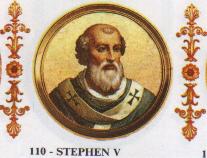
A member of a noble family, Stephen was raised in the Lateran and was ordained by Leo III. Elected to the papacy in 816, Stephen swore loyalty to Louis I the Pious, whom he crowned and anointed Holy Roman Emperor at Rheims. This incident was the first imperial anointing and indicated that the pope's seal of approval was necessary to the emperor. While at Rheims, Stephen arranged for the return to Rome of those who had opposed Leo III, whom Charlemagne had exiled to Gaul. Stephen died in 817, six months after his election.
In sources prior to the 1960s, this pope is called Stephen VI and Pope Stephen IV is called Stephen V; see Pope-elect Stephen for a detailed explanation.Pope Stephen V (Latin: Stephanus V; died 14 September 891) was the bishop of Rome and ruler of the Papal States from September 885 to his death. In his dealings with Photius I of Constantinople, as also in his relations with the young Slavic Orthodox church, he pursued the policy of Pope Nicholas I.
Early life
His father Hadrian, who belonged to the Roman aristocracy, entrusted his education to his relative, Bishop Zachary, librarian of the Holy See. Stephen was created cardinal-priest of Santi Quattro Coronati by Marinus I.
Pontificate
Stephen V was elected to succeed Adrian III on the account of his holiness. He was consecrated in September 885 without waiting for the imperial confirmation; but when Emperor Charles the Fat found with what unanimity he had been elected, he let the matter rest. Stephen was called upon to face a famine caused by a drought and by locusts, and as the papal treasury was empty he had to fall back on his father's wealth to relieve the poor, to redeem captives, and to repair churches.
Methodius of Thessaloniki was succeeded by his disciple, Gorazd. However, due to the influence of the German clergy, Stephen forbade the use of the Slavonic liturgy. Most of the Slavs then fell under the jurisdiction of the Patriarchate of Constantinople.
To promote order he adopted Guy III of Spoleto "as his son" and crowned him emperor in 891. He also recognized Louis the Blind as king of Provence. Since Archbishop Aurelian would not consecrate Teutbold, who had been canonically elected bishop of Langres, Stephen himself consecrated him. He had also opposed the arbitrary proceedings of the archbishops of Bordeaux and Ravenna, and resisted the attacks which Patriarch Photius I of Constantinople made on the Holy See. His resistance was successful, and Emperor Leo VI sent him into exile. When writing against Photius, he begged the emperor to send warships and soldiers to enable him to ward off the assaults of the Saracens on papal territory, and southern Italy and from 885 to 886 the Byzantines reoccupied southern Italy from the Muslims.
In 887/8 Stephen wrote that Christian slaves of Muslims, who were mutilated by their captors, could become priests. He also excused them if they murdered during their captivity.
Stephen, who received many English pilgrims and envoys bringing Peterspence, was buried in the portico of Saint Peter's Basilica.





